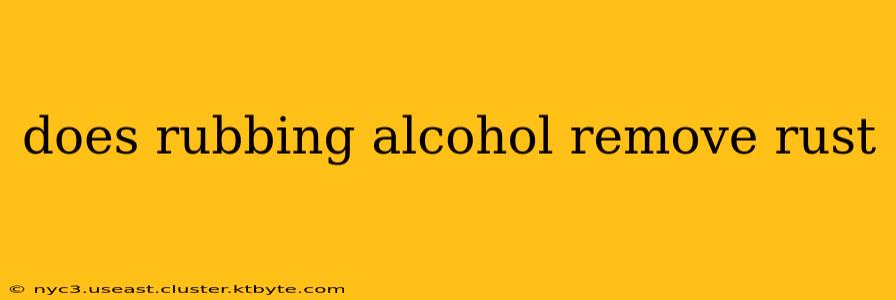Rust. That orange scourge of metal surfaces, the bane of car owners, antique collectors, and anyone who owns a tool shed. We all want to know: how do we get rid of it? And specifically, can rubbing alcohol, that ubiquitous household staple, do the trick? The short answer is: no, rubbing alcohol (isopropyl alcohol) is not effective at removing rust. However, let's delve deeper into why and explore more effective methods.
Why Rubbing Alcohol Fails Against Rust
Rubbing alcohol, typically 70% isopropyl alcohol, is a solvent. It's excellent at dissolving certain substances, but rust is not one of them. Rust, or iron oxide (Fe₂O₃), is a chemical compound formed through the oxidation of iron. It's not simply a stain; it's a chemical reaction that has altered the metal's structure. Isopropyl alcohol lacks the chemical properties necessary to break down this strong bond. While it might remove some loose surface debris or dirt that might be obscuring the rust, it won't touch the rust itself.
Effective Rust Removal Methods: A Comprehensive Guide
If rubbing alcohol won't work, what will? Several methods are effective, each with its pros and cons:
1. Steel Wool and Vinegar: A Gentle Approach
For light rust on smaller items, a combination of fine steel wool and white vinegar offers a gentle yet effective approach. The acetic acid in vinegar reacts with the iron oxide, helping to loosen and remove the rust. This method requires patience and scrubbing, but it's relatively safe and environmentally friendly.
2. Commercial Rust Removers: The Powerful Solution
The market offers a wide array of commercial rust removers, each with its own formula and strengths. These often contain stronger acids or chemicals designed specifically to break down iron oxide. Always follow the manufacturer's instructions carefully, as some are corrosive and require safety precautions. These are particularly useful for heavily rusted items.
3. Sandblasting: The Aggressive Option
For heavily rusted items where other methods fail, sandblasting can be highly effective. This method uses pressurized air to propel an abrasive material (usually sand) against the surface, removing the rust layer. However, it's a more aggressive technique that can damage the underlying metal if not performed carefully. It also requires specialized equipment.
4. Electrolysis: A Chemical Reaction for Rust Removal
Electrolysis is a chemical process that uses an electric current to remove rust. It's a relatively safe and effective method, especially for delicate or valuable items. However, it requires a specific setup and understanding of the process.
5. Prevention: The Best Rust Removal Method
The most effective way to deal with rust is to prevent it in the first place. This includes:
- Proper cleaning and drying: Regularly cleaning and drying metal surfaces prevents moisture buildup, a key factor in rust formation.
- Protective coatings: Applying paints, oils, or other protective coatings creates a barrier against moisture and oxygen.
- Storage: Storing metal items in a dry, well-ventilated area minimizes the risk of rust.
Conclusion: Choose the Right Method for Your Needs
While rubbing alcohol won't cut it when it comes to rust removal, many effective alternatives exist. The best method depends on the severity of the rust, the type of metal, and your comfort level with different techniques. Remember to prioritize safety and always follow instructions carefully when using any rust removal method. Ultimately, prevention is key – proper care and maintenance can significantly reduce the need for rust removal in the first place.

